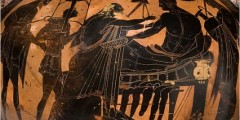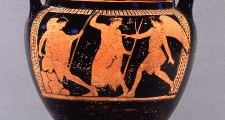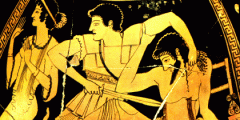Martin Litchfield West OM
December 31, 2013
Humble and hearty congratulations to Martin West on his appointment as a member of the Order of Merit. He is the seventh classical scholar to receive this exclusive honour in the 111 years of the Order’s history, following Sir Richard Jebb (1905), Henry Jackson (1908), Sir James Frazer (1925), J.W. Mackail (1935), Gilbert Murray (1941), …
Triptolemus’ Trips, or Around the World by Snake Power (part 1)
December 2, 2013
In 468 BC the tragic dramatist Sophocles won the City Dionysia for the first time. He was about twenty-eight years old, which was good going; Aeschylus gained his first victory when he was forty, Euripides when he was thirty-eight or so, and each of them had been competing at the festival, on and off, for …
Only seen dead
November 4, 2013
Greek tragedy was not always about death, but it very often was: of the 32 tragedies that survive in full (or almost in full), there are only nine which do not include the death of at least one character. What is more, while violent death was not seen on the tragic stage (with the very …
Aeschylus’ ghost writer?
September 20, 2013
We are familiar today with the phenomenon whereby new novels are published in the style of, or as sequels to, the work of popular or classic authors, most recently in the case of Agatha Christie. This of course is done quite openly, and everybody knows that it’s not actually an undiscovered work of the great …
The Oresteia explained
June 25, 2013
Steven Pinker, the linguist, cognitive scientist and author of half a dozen must-read books (including How the Mind Works, The Stuff of Thought, The Blank Slate and The Better Angels of our Nature), wrote in his 2007 article “A history of violence” : “Life in a state of nature is nasty, brutish, and short, not …
Song, dance, drama
April 24, 2013
This post is by Richard Rawles. Since attending a conference in London during the Easter vacation, I have been thinking about Greek tragedy as a form of music drama, and how hard it is for us as modern readers to grasp this. If we watch a musical or an opera, one of the things which …
Thoughts of a serial translator
April 10, 2013
Here … is the text of the plenary lecture I gave at the annual conference of the Classical Association at Reading last Wednesday. Next year’s conference is in Nottingham. It will be a bit later in April, and we hope the weather will be better! Alan Sommerstein
Furies travelling light
March 6, 2013
One doesn’t normally think of ancient Greek women (at least if they were of respectable status), let alone goddesses, as showing more than half a leg in public, but here is a goddess doing just that – and what is more, if you believe Apollo (and Apollo, if you believe Apollo, never lies), she is …
Thoughts about Aeschylus’ Oresteia
October 11, 2012
Alan Sommerstein reflects on some issues raised in Aeschylus’ Oresteia trilogy which are as vital now as they were in 458 BC when it was first produced. This post originally appeared in the “Writer’s Choice” series on the blog of Prof. Norman Geras (www.normblog.typepad.com). Grateful thanks to Prof. Geras for permitting it to be …









